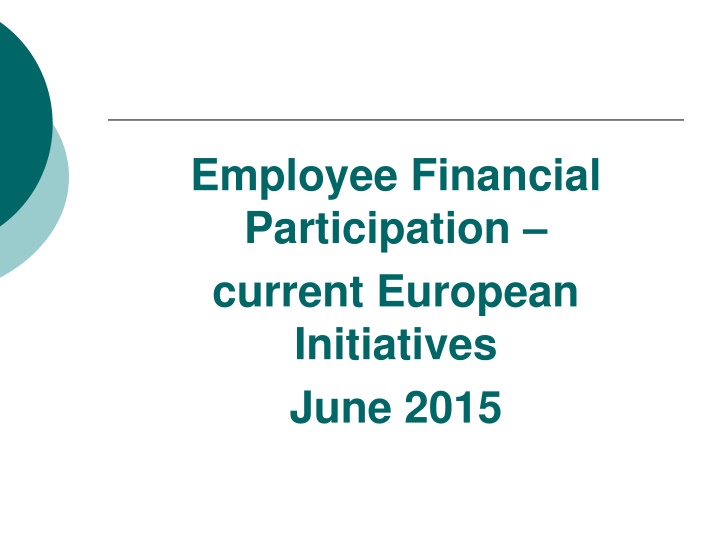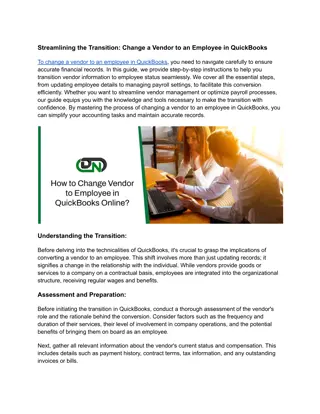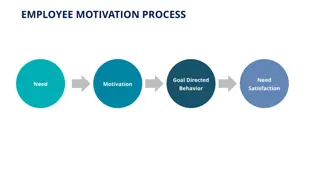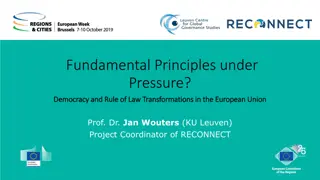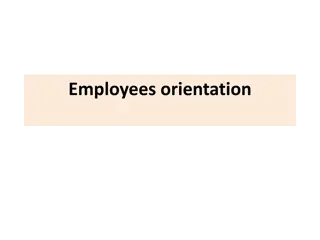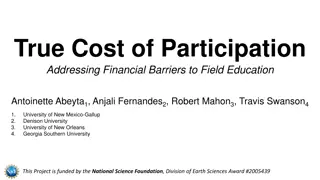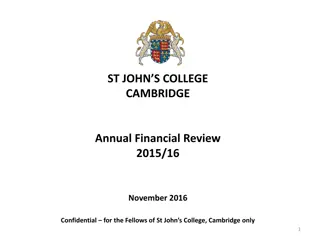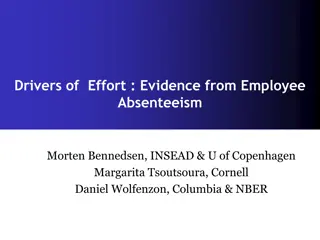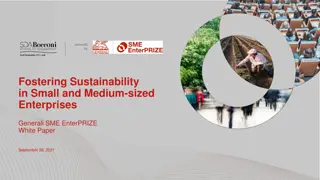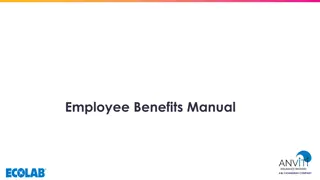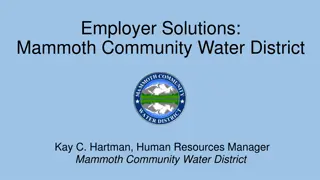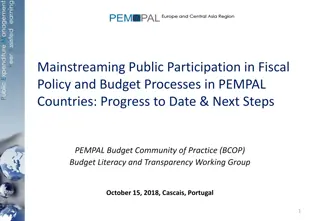Employee Financial Participation in European Initiatives - June 2015
It all started in the Basque country with a focus on employee financial participation. Explore the case study of Basque/Czech regions and OECD's 2014 Wellbeing Report. Discover actions taken to support entrepreneurship and key recommendations for EFP in Europe.
Download Presentation

Please find below an Image/Link to download the presentation.
The content on the website is provided AS IS for your information and personal use only. It may not be sold, licensed, or shared on other websites without obtaining consent from the author.If you encounter any issues during the download, it is possible that the publisher has removed the file from their server.
You are allowed to download the files provided on this website for personal or commercial use, subject to the condition that they are used lawfully. All files are the property of their respective owners.
The content on the website is provided AS IS for your information and personal use only. It may not be sold, licensed, or shared on other websites without obtaining consent from the author.
E N D
Presentation Transcript
Employee Financial Participation current European Initiatives June 2015
Background It all started by living in the Basque country with 2.2mil inhabitants, exactly in the province of Gipuzkoa with its 710.000 inhabitants where the Social Economy accounts for 10% of employment. Roughly, 50% of this employment is in manufacturing. In Gipuzkoa, there are 15 jobs in the Social Economy per square kilometre.
Background I suspect is among the highest rates around the world, in the same way that, with respect to fine restaurants, the number of Michelin stars per square kilometre is the highest in the world. I have decided the Basque Country makes an excellent case study since there are some interesting parallels between the Czech Republic and this region in the north of Spain.
Case study: Basque/Czech Regions 1. It experienced 40 years ago a transition from an authoritarian regime to democracy in some ways comparable to that experienced by Czech society 25 years ago. 2. The Basque Country is today a comparatively wealthy European region the GDP per capita is roughly 140% of the European average, with an important concentration of metallurgic industry and manufacturing SMEs.
Case study: Basque/Czech Regions OECD 2014 REGIONAL WELLBEING REPORT Household disposable income Basque country Prague Moravia Bavaria Euro 19.445 13.650 9.515 20.237
Initial Action In September 2014 Paper on How to support entrepreneurship through Employee financial participation in the Czech Republic including the best practice from Mondragon In October 2014 organised a Seminar under the auspices The Council for sustainable development of the Office of the Government,
Summary & Recommendations on EFP in Europe 1. The debate on EFP at the European level and in the Member States must be re-launched, awareness raised and social partners encouraged. 2. Businesses operating across borders, particularly SMEs should be offered help, especially in overcoming tax obstacles in specific EU/EEA countries. 3. The introduction of EFP must be voluntary; it must be in addition to existing remuneration systems and not a substitute, independent of pension schemes while not impeding collective wage bargaining.
Summary & Recommendations on EFP in Europe 4. EFP may bring desirable benefits such as: a proportion of company profits distributed to employees locally, which in turn helps to increase regional purchasing power and can boost a company's chances of success in a given region, Improve corporate governance and corporate management which helps to improve incomes through participation in a company's success, a motivating effect and thus a contribution to a greater sense of identification with the company, thus reducing staff turnover. it can root economic activity in a region, lowering unemployment in general, and especially during downturns. 35 years of scientific research shows that when efp is combined greater transparency and employee participation in decisions, company performance generally improves (growth, productivity, profitability, innovation, etc.)
Summary & Recommendations on EFP in Europe 5. Examples of best practice should continue to be publicised. Related activities should be supported by the EU budget through a dedicated budget heading. 6. Information sources on the implications of EFP for businesses and employees as well as training and advisory services by impartial bodies, i.e. qualified NGOs, should be established. These facts are derived from the Opinion of the European and Social Committee on EFP in Europe in 2010
Initial Action 4 main strategies identified: 1. Focus on reducing the lack of information / Education. 2. Promotion of the positive experiences via case studies / Best practices. 3. Initiation of steps to conquer the ideological myth. 4. Identification of legislative obstacles & drafting of relevant legislative changes.
EU Actions Pilot Project The EU project Implementation of the Pilot Project Promotion of Employee Ownership and Participation , therefore assesses EFP across the EU-28 and aims at the formulation of possible regulatory and non-regulatory actions to promote EFP at EU level. The pilot project is part of the EC s 2012 Action Plan on European Company Law and Corporate Governance.
EU Actions Conference in January 2014 As part of the Pilot Project, the conference Taking action: Promotion of Employee Share Ownership was organised by DG MARKT in January 2014 ((https://scic.ec.europa.eu/streaming/index.php?es=2&sessionno=db095b d14b838cbf3abf886f492c721b)
EU Actions Study The Promotion of Employee Ownership and Participation commissioned by DG MARKT and prepared by the Inter-University Centre Final Report was published in October 2014 The Commission has decided on a major restructuring of the new DG dealing with Internal Market, Industry, Entrepreneurship and SMEs which was created at the beginning of 2015 DG Growth
Five-Point Plan: Launch a Virtual Centre for EFP Set up a Commission Expert Group Implement an Action Program to raise awareness Launch of Code of Conduct Legislative proposal for a Common Optional European Regime Study tax benefits for EFP. Even if they are modest,, they can have a significant incentive effect . 1. 2. 3. 4. 5.
Five-Point Plan: 1. Launch a Virtual Centre for EFP Action 1: Provide an online tool that could be uploaded on different websites, giving easy access to information on EFP across the EU-28 Action 2: Include an effective tax rate calculator as a complementary decision making tool comparing social security contributions and taxation of EFP in the 28 Member States
Five-Point Plan: 2. Set up a Commission Expert Group Action 3: Set up an expert group on EFP with the following tasks: Give regular policy recommendaitons an EFP on the basis of best practice and update the information on EFP available through the Virtual Centre for EFP Prepare the elaboration of a Code of Conduct for EFP compiling information on standard EFP templates and on employee guidelines to EFP and continuosly improve this toolkit Assist the Commission in checking the feasibility and preparing potential future draft legislation on EFP
Five-Point Plan: 3. Implement an Action Program to raise awareness for EFP Action 4: Launch an information campaign and engage with employers and workers representatives and other stakeholders. This should be accompanied by a PT strategy. Action 5: Implement a package of awareness raising measures, e.g. Allocate the EFP related activiities to one specific Commissioner responsible for EFP
Five-Point Plan: 3. Implement an Action Program to raise awareness for EFP Eg. Because EFP is a cross sectorial topic, the individual actors from different political bodies and their network can have a considerable effect. Therefore, appointment of a specific Commissioner to increase the visibility of the EFP topic is crucial since the personal involvement of individual actors is a proven factor in moving initiatives forward.
Five-Point Plan: 3. Implement an Action Program to raise awareness for EFP Develop a network of officials / politicians interested in EFP from political bodies at EU level Popularise EFP in a media friendly manner, e.g. information leaflets or short videos - https://www.youtube.com/watch?v=yxzwxOcbsHM Undertake additional publicity actions, e.g. establish a European EFP Day
Five-Point Plan: 4. Launch of Code of Conduct for EFP Action 6: Elaborate standard templates for EFP schemes based on best practice resulting from the EU pilot project. Such off the shelf templates would be of a general nature, taking into consideration different existing national models and traditions of EFP as well as the different types of firms concerned. Common definitions of relevant concepts could be also collected in this context.
Five-Point Plan: 4. Launch of Code of Conduct for EFP Action 7: Develop a guide on EFP for employess describing in a clear way the concept of EFP, the options for employees as well as potential pitfalls. Standard templates & guide for employees could be made available via the Virtual Centre for EFP.
Five-Point Plan: 5. Legislative proposal for a Common Optional European Regime on EFP Action 8: Verify the legal basis and feasibility of a Common European Regime on EFP as requested by the European Parliament Resolution of 2014. such a voluntary 2nd regime would function in parallel to national laws and would contribute to creating a level playing field for EFP. Study tax benefits for EFP. Even if they are modest,, they can have a significant incentive effect.
EU Actions Table: Classification of EU Member States based on regulatory density and support measures for EFP
Conclusion We can have democracy in this country or we can have great wealth concentrated in the hands of a few, but we can't have both. Attributed to Louis D. Brandeis, American Judge Inspiration and guidance from professor in Social Economy and Cooperative Entreprise Fred Freundlich from Mondragon University Eskerrik asko
